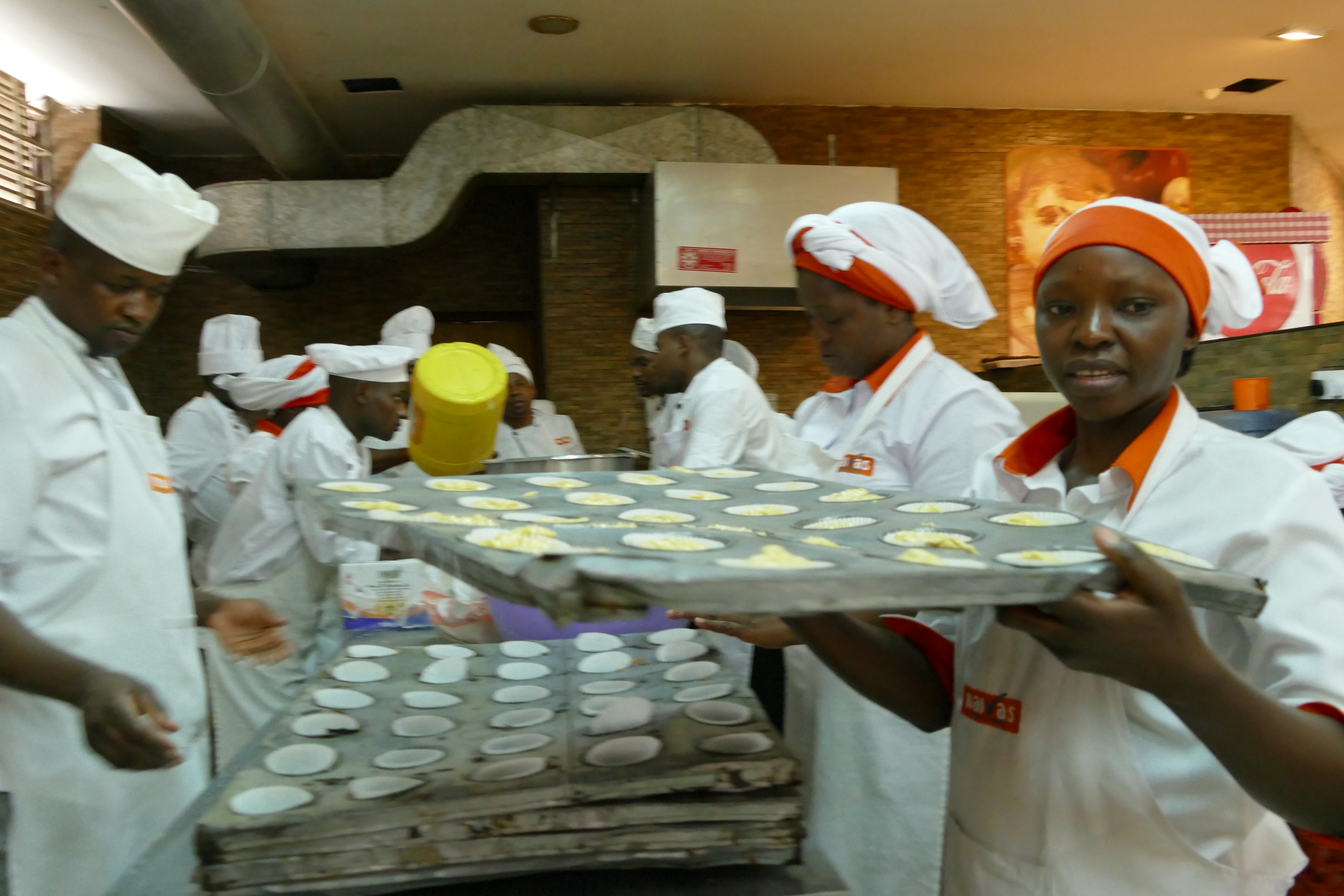
On 29-30 April 2017, 24 bakers from Naivas stores in greater Nairobi were trained on using orange-fleshed sweetpotato (OFSP) puree for bakery applications. The training, held in the Naivas Kitengela branch, was organized by Tawanda Muzhingi, a food scientist at the International Potato Center (CIP), and Antonio Magnaghi a product development specialist and proprietor of Euro-Ingredients Limited.
Naivas Supermarkets is the third largest supermarket chain in Kenya, with over 40 stores, most of them concentrated around the greater Nairobi area. The company is interested in introducing OFSP puree products in their bakeries to cater to a growing niche market.
“Nowadays we see that people are health conscious about what they are consuming and they have been asking for a health bread. We want to introduce a health corner in our bakeries. Sweetpotato puree bread will be one of the healthiest breads we introduce in our market and we hope it will do well,” explains Dickson Okello, the chain’s bakeries manager.
The orange-fleshed sweetpotato is high in beta-carotene, a precursor to vitamin A. It is also high in fibre. Muzhingi says that in addition to these nutritional benefits to the customers, using orange-fleshed sweetpotato puree is a smart business move. “Naivas will make great savings because they are going to reduce the amount of wheat they use in their bakery applications. Most of the wheat is imported, and now they are using a local ingredient grown by local farmers,” he explains.
Although sweetpotato is the third most important food crop in Africa, it remains one of the least marketed. This could be attributed to the long-held perception of sweetpotato as a poor man’s food. However, as incidences of chronic diseases typical of western countries rise, urban consumers are increasingly seeking healthier, more nutritional foods. At the same time, a rapidly growing middle class and rate of urbanization have generated a larger bread market. Sweetpotato is becoming a healthy alternative. It can deliver a healthy, tasty bread that is friendly to the pockets of consumers, while at the same time providing opportunities for enterprises to increase their profit margin.
Why OFSP puree?
Sweetpotato is a highly perishable commodity. Efforts to use orange-fleshed sweetpotato flour have been common, but it is a dry product that limits easy formulation into food products. Production of flour is economically inefficient, with 7 kg of fresh orange-fleshed sweetpotato roots producing only 1 kg of flour. There is loss of beta-carotene during drying and processing and the products made from this flour have generally had low consumer acceptance because it affects the flavour of the finished product very much. Conversely, the puree is easy to formulate into a variety of food products. It has a high conversion, with 1.3 kg of fresh roots producing 1 kg of puree, and there is no significant loss of beta-carotene.
At CIP, puree, made by mashing steamed orange-fleshed sweetpotato, is being promoted to replace 20-50% wheat flour requirements in bread, buns and muffins. During the training of bakers from Naivas Supermarket, these are some of the products they developed and baked – and their response was of excitement to have discovered a new product, and optimism about how their customers would respond.
“What is interesting is that we are using natural ingredients to make a new product. I love the bread, it came out perfectly. I think customers in Syokimau will like it,” said Geoffrey Mwangi, a baker at Naivas Syokimau Branch. His opinion was based on the experience during the training, when they tested the bread’s acceptability among the customers at Kitengela Branch. According to another baker, Angela Mbithe, the sampling session had a good turnout, and customers left good reviews.
Growing the value chain
George Akoth Ochuka, the bakery supervisor of Ngong Town Branch acknowledged the selling points of the new products, but cautioned that to sell, customers would have to get convinced. He stated that promotion and marketing would be key to successful introduction of the orange-fleshed sweetpotato products into the market.
This is another area that CIP will provide technical support. Apart from linking Naivas to an already established puree processor, CIP will help Naivas to develop promotional and marketing materials and campaigns.
These activities are in line with the objectives of the Accelerated Value Chain Development (AVCD) Program, which among other things, aims to strengthen the entire sweetpotato value chain. The program is funded by USAID’s Feed the Future initiative in Kenya. According to Penina Muoki, the program manager, this is because increased demand for bread will create employment and income opportunities along the entire chain.
“The work with the farmers creates opportunities along the value chain – first for the farmers, and for puree processing, for the youths and women in Western and Central Kenya and we hope to replicate this throughout the country and in other stores, and throughout the region in sub-Saharan Africa,” adds Muzhingi.
For more photos from the training, visit the following link: Bakers training held at Naivas on Flickr